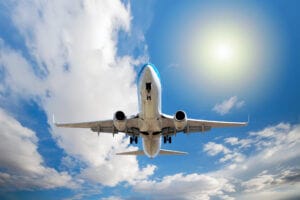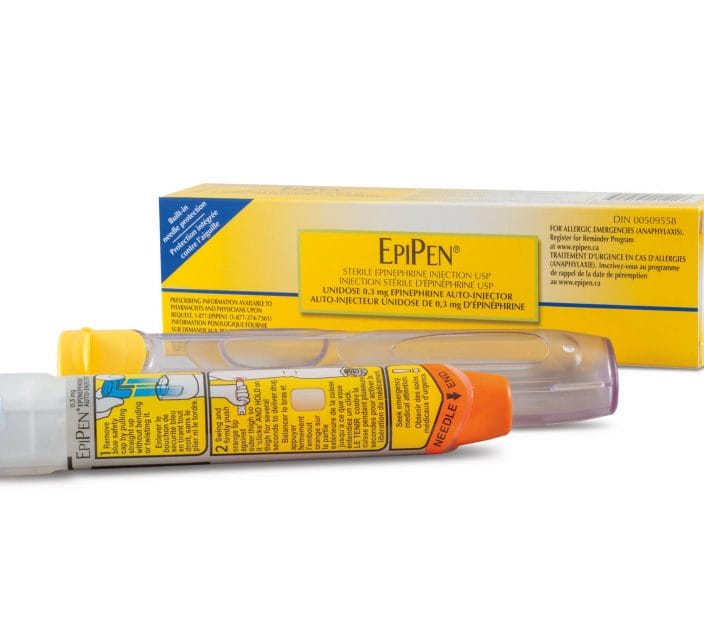
Epinephrine auto-injectors must be included in the emergency medical kit of every commercial flight, three U.S. senators have told the Federal Aviation Administration (FAA).
The lawmakers wrote a letter urging the federal agency to remedy “life-threatening omissions” in its airline medical equipment requirements.
“The glaring gap in FAA’s regulations disregards the widely-accepted guidance by medical professionals who stress the importance of epinephrine auto-injectors in treating anaphylaxis,” the letter reads.
Dr. Mike Varshavski tells Allergic Living it is unacceptable that epinephrine auto-injectors are not stocked on all flights. Including auto-injectors in airline medical kits is a simple solution, says the family medicine physician.
Varshavski has experience with having to improvise without an auto-injector. On a 2019 flight, he treated a passenger who was suffering a life-threatening allergic reaction.
“The cost of an auto-injector is a small one to pay to prevent a loss of life while mid-air,” says Varshavski, known as “Dr. Mike” on YouTube.
The FAA requires airlines to have emergency medical kits (EMKs) on commercial flights. But epinephrine auto-injectors are not among the required medication devices, according to the rules last updated in 2004. Only vials of epinephrine are part of the kits, and those do not always include the proper dosage for anaphylaxis.
As well, some healthcare professionals may not know the proper dose to treat anaphylaxis or might not be comfortable drawing the medication into a syringe, says Dr. Kimberly Blumenthal. “Auto-injectors ensure the correct dose, form, and administration in a simple way that anyone can use,” says the Massachusetts General allergist.
“It has been a safety hazard to not have auto-injectors on flights,” she says.
Allergic Living has covered numerous instances where epinephrine auto-injectors were not available on flights. This includes Blumenthal’s experience, where she asked other passengers for their medication.
Outdated FAA Requirements
In their December 11, 2023 letter, Democrat Senators Elizabeth Warren, Chuck Schumer and Edward Markey also seek regular review of requirements for airline emergency medical kits.
Food allergy and airlines advocate Lianne Mandelbaum agrees with the need for an FAA requirements update.
“I am heartened by the senators’ letter that elucidates the urgent need to require epinephrine auto-injectors on all airlines,” says Mandelbaum, founder of the nonprofit No Nut Traveler. “I have long been fearful that it would take an anaphylaxis death to prompt change,” said the advocate, who often writes for Allergic Living.
Food allergy advocacy groups, including No Nut Traveler, sent a letter in May 2023, urging lawmakers to address EMKs in the 2023 FAA Reauthorization bill. The letter asks members of the Transportation Committee to include a provision that requires a review of airline medical kits and ensures the inclusion of epinephrine auto-injectors.
The House signed off on the 2023 FAA Reauthorization bill in July 2023 – without a provision addressing auto-injectors. The Senate’s version of the bill is currently stalled.
In their respective letters, the three senators and the allergy groups both point out the guidance from the largest professional organization for aerospace medicine.
The Aerospace Medical Association recommended the inclusion of epinephrine auto-injectors in airline medical kits in a 2019 guidance document. The association noted the ease of use of auto-injectors, especially if there are no medical professionals on a flight.
Varshavski finds it dangerous that airlines currently rely on a qualified healthcare professional being on board and able to step in during an anaphylactic emergency.
Without an epinephrine auto-injector, the medical professional also must know the right dosage “and be able to make complex conversions during a hectic situation where minutes can be the difference between life or death,” he says.
Improvising With No Auto-Injector
It was during a transatlantic flight from New York to Tel Aviv in 2019 that Varshavski stepped in to treat a passenger suffering anaphylaxis. In the emergency kit, he found only epinephrine dosed for cardiac distress, which is incorrect for anaphylaxis. It was a tense situation, but he was able to adjust the dose to treat the fellow traveler.
Varshavski is concerned someone could inject the wrong dose or not act quickly enough without an auto-injector available. “Neglecting the reoccurring scenario of medical responders on planes being overwhelmed by varying dosages and preparations is a recipe for disaster,” he says.
Blumenthal agrees that forcing medical professionals to improvise during an in-flight emergency can be perilous.
On two different flights in 2021 and 2022, she treated passengers who were experiencing allergic reactions to food. She resorted to crowdsourcing for epinephrine auto-injectors, walking the aisles and asking if anyone had the lifesaving medication that she could use.
The patients, a 20-year-old woman and a 10-year-old girl, recovered under Blumenthal’s care. In both cases, the doctor said she didn’t need the epinephrine immediately. “But I wanted to have an auto-injector available … to quickly escalate treatment if needed,” the allergist says.
However, borrowing another passenger’s single use auto-injector may leave that traveler without medication for an emergency.
In-Flight Auto-Injector Tales Grow
Allergic Living’s reporting shows a reoccurring theme of passengers needing auto-injectors for in-flight allergic reactions, but not finding them available. A few other instances include:
- In 2022, pediatric orthopedist Dr. Samara Friedman managed to jerry-rig a cardiac epinephrine device to treat a young woman with symptoms of anaphylaxis after eating the airline’s meal. The nut-allergic passenger realized the meal contained cashew as she started experiencing symptoms over the Atlantic Ocean. In error, she had left her personal auto-injectors with her parents, who were on a different flight.
- In 2018, New York City nurse Kellie Hopkins stepped forward to help a child with no previously known allergies who was having an anaphylactic reaction. Finding no auto-injector in the medical kit, she asked the flight crew to make an announcement seeking an auto-injector from fellow travelers. Two auto-injectors were offered up. Hopkins did not feel she had time to look up the dosage if she had to use epinephrine from a vial.
- In 2014, a 4-year-old experienced a first-time anaphylactic reaction on a flight from Ireland to the United States. Dr. Patricia Leonard had to rifle through the emergency medical kit to find a vial of epinephrine. She needed to give the girl two shots to get her in stable condition. The allergist voiced her concern at the time that not all doctors would know the proper dose for a 4-year-old.
Senators and Next Steps
In their letter, the senators allude to the life-threatening situations where fellow passengers must work around the limited equipment in medical kits when they have offered to help.
“These travelers were fortunate, but we cannot continue to rely on good fortune to protect the 2.9 million passengers on every one of the 45,000 daily airline flights in the United States,” the letter states. They ask the FAA for a briefing to reply to their letter in 30 days.
Mandelbaum feels buoyed by the support from both lawmakers and the advocacy groups. She hopes the efforts will lead to change requiring epinephrine auto-injectors in airline medical kits.
“I am hopeful that FAA will initiate a rulemaking protecting the millions of passengers who have food allergies,” she says. “We have the opportunity to act before a tragedy occurs.”
Related Reading:
Why Your Plane’s Medical Kit May Lack Drugs like Epinephrine
Plane Diverts for Allergic Reaction: Why No FAA Report?





